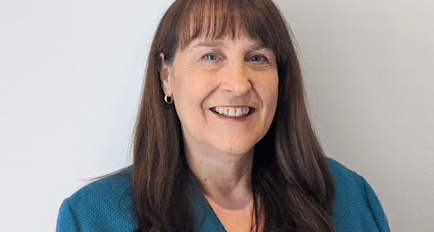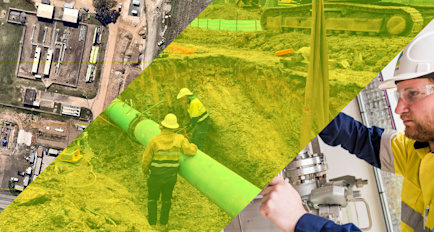The Malabar Biomethane Injection Project (MBIP) involves constructing a biogas upgrader facility to process raw biogas from the anaerobic digestion plant at Sydney Water's Malabar Wastewater Treatment Plant (WTP), with the biomethane to be blended into Jemena's New South Wales gas distribution network.
Zinfra is engaged for project management, engineering, procurement, and construction. Currently, procurement is almost complete and equipment is in the last stages of fabrication and assembly, with early construction works underway on site as well.
Zinfra's client is Jemena, but the project is a collaboration between Jemena and Sydney Water – Jemena is the owner of the assets, Sydney Water the owner of the land and supplier of the raw biogas, and Zinfra the developer.
Working with Jemena and Sydney Water, Zinfra needed to be a trusted partner to both utilities, which meant building trust and finding innovative ways to incorporate new technology.
The role of biomethane in circular economies
The MBIP is an Australian-first and the project is expected to initially avoid 5,000 tonnes of carbon emissions annually, with the potential to scale up to 11,000 tonnes.
The core idea behind the MBIP is creating a circular economy – through turning waste into energy, and re-using products rather than disposing of them.
Sewage from southern Sydney is treated at Sydney Water's Malabar WTP. The treatment process produces biogas as a by-product, which is made up of approximately 60 per cent methane and 40 per cent carbon dioxide. The methane is then processed through Jemena's upgrader facility on site before being blended into the existing natural gas network as renewable gas.
Zinfra Operations Manager, Gas Projects, Justin Anderson, said Sydney Water currently use some of the biogas to generate electricity and heat for use on their site, and the excess, that is currently burnt in their flare, is what the biomethane project will utilise.
"At this stage, it's flared and sent into the atmosphere, so by reusing the methane within the network to displace natural gas it's a great thing for the environment" Mr Anderson said.
Zinfra understands the strategic importance of this project as it will offer an innovative approach to reducing emissions from natural gas, which means they have to give the project its best chance of success by working alongside not only its client Jemena, but Jemena's partner Sydney Water.
Building trust for both partners
With this proof of concept project, Jemena and Sydney Water are learning from each other through the entire process, with Zinfra leading the early development.
Zinfra has a long track record of delivering natural gas and renewable gas projects across Australia, including the Atlas project for Senex, the Western Sydney Green Hydrogen Hub for Jemena and the Port Kembla Energy Terminal to Eastern Gas Pipeline for Squadron Energy (construction starts later this year).
All of these projects require close stakeholder management and Zinfra knows to keep everyone on board throughout the whole process. On the Malabar project, Zinfra must ensure that both Jemena and Sydney Water are in the loop when it comes time for handover to operations.
"A very important piece is the handover of the new assets to the Jemena asset management organisation. They start the ball rolling with initial concept development, we do the project execution in the middle, then they come in and take over the asset after commissioning," Mr Anderson said.
"We need to make sure that Jemena comes along for the ride and ensure that they understand what they're going to be inheriting when we do the handover."
Working with Sydney Water, particularly constructing on their site, has been a process of trust-building for Zinfra.
"Zinfra taking on the main contractor role on that site over the course of a year has been all about building trust and demonstrating that our systems and processes, in particular around health and safety management, were up to the standard that Sydney Water would set for themselves", Mr Anderson said.
Adapting to new technologies
In Europe, according to the Future Fuels Cooperative Research Centre, there are approximately 300 biomethane projects underway. Zinfra engaged Brisbane-based innovative solutions company Eneraque to deliver the upgrader package, who in turn contracted a biomethane specialist in the Netherlands, Bright Biomethane, to provide the major equipment.
However, Mr Anderson said it's not possible to directly accept European packages because they are not made to meet Australian standards.
"The conversion of the electrical parts of our packages that we buy from Europe to meet the Australian standards is quite a complex task," Mr Anderson said.
Mr Anderson said Zinfra has particular expertise in bringing in technology from the US and Europe, so they are well prepared to ensure the equipment meets Australian standards.
When it comes to a first-of-its-kind project, Zinfra understands the importance of bringing not only innovative technology, but new ways of encouraging others to follow suit.
Campaigning together for innovation
A unique part of Jemena and Sydney Water's partnership for this project has been to work with ARENA to introduce innovative technologies and prove that renewable gas can be an efficient energy source.
In Australia, biomethane and green hydrogen are emerging renewable energy sources and research and development continues into how best to integrate them into our current energy systems. By using the infrastructure already in place, we can significantly reduce the cost of bringing renewable gases to market.
Biomethane from Malabar will be the first renewable gas to go through a pilot certification process being led by renewable energy accreditor GreenPower, similar to the system in place for renewable electricity. The goal of this pilot is to verify and certify the origins of the renewable gas and ensure that certificates can only be generated for renewable gas injected into the network.
Part of the proof of concept is not just the application of the technical equipment and engineering and showing that it actually works, but the concept of having the renewable gas certification offering traceability," Mr Anderson said.
"Having that certification system in place is what's really going to encourage others in the industry to get renewable gas into the network, allowing bioenergy to play a much bigger part in the future energy mix."
The MBIP is expected to start producing biomethane by the end of 2022 with the certification pilot to begin in early 2023.
As the project continues development and construction, the way forward for Zinfra to ensure a smooth handover and the project's success will be to continue fostering partnerships based on trust, innovation and collaboration.




